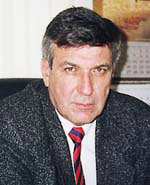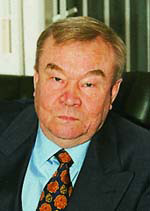Vladimir Shlyomin
Over 1.3 million people from 783 primary organizations, employees of companies and enterprises of all ownership forms in the field of iron&steel and nonferrous metals industries, mining and concentration of ores, noble metals and precious stones are united into Miners' & Metallurgical Workers' Trade Union of Russia – GMPR. Its committees are in 30 regions of this country, and 50 units more work in direct contact with the Central Council of the Trade Union.
The Constituent Congress of the new trade amalgamation of miners and metallurgists was held in January, 1991. The Charter adopted by the Congress claimed that the new trade union is free and independent in relations with executive authorities, employers and their associations, public organizations and social movements, political parties.
"At the very start of their activities the trade union‘s leaders faced problems whose solution governed the union‘s capabilities to skillfully represent the workers‘ interests in the labor market", GMPR‘s Chairman Mikhail Tarassenko says. "We needed to define our policy towards governmental and legislative bodies, enterprises‘ administrations and owners, with the unity of our organization to be maintained, keeping an interaction with trade unions of other industrial sectors in order to consolidate the trade union movement in Russia. At this stage, it turned out very useful to interact with similar trade unions of other industries which had accumulated large practice of work in market conditions.
In consideration of the situation developing in this country, GMPR decided to adhere to the following principles in its activities:
– to support the course of economic reforms with due regard to their social orientation,
– to conduct continuous work with state bodies for protection of employees‘ interests,
– to advocate social, labor and economic interests of working people with due regard to operating capabilities of enterprises to be retained and production to be developed,
– to follow the principle of social partnership as a basis of agreements with employers, i.e., not only to demand but also to promote a successful solution of production problems,
– in the case of conflicts, to prefer constructive discussions and not confrontation – strike is an extreme measure,
– to build relations with other trade unions based on solidarity, mutual support and unity of actions.
|
 Mikhail Tarassenko
Mikhail Tarassenko
Mikhail Tarassenko was born in 1947. Steel engineer and political observer by education. He was a foreman and section head at the Taganrog Iron & Steel Work.
In trade union activities since 1976: first at the plant, and after that in the Central Committee of the Metallurgists‘ Trade Union. For three years he was General Secretary of the International Amalgamation of Trade Unions – Soyuzmetall Professional Center.
Chairman of the Mining & Metallurgical Trade Union of Russia since 1996 and, at the same time, a member of Executive Committee of General Council of Federation of Independent Trade Unions of Russia, a coordinator of activities of member organizations of International Federation of Metalworkers in CIS countries.
| |
| |
|
The main lines of the trade union‘s activities are protection of employment rate and assistance in new jobs to be created, prevention of mass dismissals, support of fair wages and salaries, labor and health protection. The trade union represent the interests of the workers in negotiations with employers and the government, as a member of the Russian tripartite committee on regulation of social and labor relations. An industrial tariff agreement and collective agreements at enterprises become the key documents where results of negotiations are recorded. They dictate a labor payment level, a minimum tariff rate, bonuses for multi-shift work, heavy and bad labor conditions, etc.
The Branch Tariff Agreement for 2001-2002 in the mining & metallurgical complex of the Russian Federation was concluded between the workers in the person of the Central Council of GMPR and the employers in the person of the Association of Industrialists of the Mining & Metallurgical Complex of Russia. The parties agreed on the joint elaboration of a procedure affording a more well-grounded establishment of labor payment for all categories of workers.
Collective agreements concluded based on the Industrial Tariff Agreement secure social protection of 96 % of workers of the sector. The tariff rates in the agreements were 10-15 % increased, the necessity to socially protect young workers and their families‘ members was taken into account. The employment situation has been changed for the better: within one year the number of jobs in the complex grew by 70,000.
As before, the industrial fund of social insurance in the Russian mining & metallurgical complex is active, and the enterprises have medical and health institutions of their own. Annually, up to 100,000 workers rest or improve health in sanatoriums/dispensaries, over 40,000 in sanatoriums and resort hotels, 120,000 children in rest camps. This system inherited from the socialist epoch is in fact subsidized, with employers incurring the costs of so-named social amenities.
Up to now, the disputes whether or not it is expedient to retain this tradition still continue. The critics are right in pointing out that in market competition it is an impermissible luxury that even the most prospering companies in the West are not able to indulge in. A social sphere available as a compulsory department at any metallurgical or mining enterprise lowers profitability. Besides, the funds are inevitably redistributed at the expense of restriction of direct labor payment growth. The advocates of this system, and the trade union is among them, examine the problem at large from their own viewpoint. When the income of the overwhelming majority of the population is at a low level medical and health-care institutions cannot operate on pure commercial principles, and municipal units do not have as yet financial abilities to allocate subsidies for this purpose.
In the course of reforms the Government tried to reach the unification of social insurance and insisted on the liquidation of industrial insurance funds. These plans were mostly implemented. That the metallurgists maintained their own social support system beyond the control of state bodies is considered by GMPR to be its main credit.
The trade union of miners and metallurgists is consistent in developing ties with its colleagues in Russia and other countries.
"After the IMF (International Metalworkers Federation) in San-Francisco when we became a full member of the world metallurgists community, GMPR at once received an advantage of trade union solidarity", Mikhail Tarassenko says. "We are constantly assisted by IMF in many fields of trade union activities. For example, the protest action by Russian trade unions in the end of 2001 was supported by all delegates of the 30th Congress of IMF in Australia: a solidarity message signed by General Secretary Mr.Malentakki was sent to Russia at the date of the action".
Recently, the representatives of GMPR‘s regional departments and primary units participated in the workshop named "Restructuring of Steel Industry in the UK and Participation of Trade Unions in this Process" which was formed by the Confederation of Steelmakers of the UK and Steel Partnership Training. The members of our delegation got familiarized with the program elaborated by the Confederation experts for restructuring of transnational Corus works. GMPR also maintains regular contacts with the trade unions of metalworkers and metallurgists of Austria, Denmark, Germany, Belgium, Luxembourg, USA, Sweden, Finland, Japan.
Nowadays GMPR is a member of the Federation of Independent Trade Unions of Russia (FNPR), International Association of Miners & Metallurgical Workers Unions of CIS Countries, the Trade Union Center Soyuzmetal and the International Metalworkers‘ Federation (IMF). "We strive for such a position when our trade union can become an influential force in this country and successfully protect the workers‘ interests as it was adopted all over the civilized world long ago".
Association of Industrialists of Mining & Metallurgical Complex of Russia was set up at the promoters‘ meeting on December 11, 1997. Its objective is to advance the urgent problems of the metallurgists before the federal authorities and to establish social partnership in the industry. Now the association numbers over 150 enterprises and organizations whose personnel amounts to 490,000 in total. Anatoly Sysoev, General Director, Bogoslovsky Aluminum Plant (a branch of Siberian & Ural Aluminum Company JSC), is an elected president.
The association represents the employers‘ interests in legislative and executive bodies. The work on the reforming of the Labor Code of the Russian Federation has been going on for several years. The Board of Directors summarized the enterprises‘ and companies‘ proposals and defined a united stand. The association members managed to come to a coordinated version of the Labor Code. The finalized enactment draft comprised a considerable part of the proposals by the employers of the mining and metallurgical enterprises.
The association is an active lobbyist of the industry‘s interests towards tax reduction. The legislative monitoring of fiscal law is one of the most important tasks.
|
 Anatoly Sysoev
Anatoly Sysoev
Anatoly Sysoev, 67, is one of the few directors of the Soviet era, who managed to perceive the market economy principles and to successfully show his worth in the metallurgical business. Electrolysis expert, author of 64 inventions related to the technology of producing aluminum and aluminum alloys. Worked at the Krasnoyarsk and Tajik aluminum plants, the most advanced enterprises of non-ferrous metallurgy. Since 1987 till present the general director of the Bogoslovsky aluminum plant, the leading enterprise of SUAL-Holding company.
Sysoev does not limit himself to the plant operation. He tries to take into account interests of all metal producers, unite them and stand up for their consolidated position. Sysoev initiated forming the Association of industrialists of Russia‘s mining-and-metallurgical complex (AMROS), the first employers‘ association in the industry.
Distinguished by his energy, uncommon for his age. Capable of traveling round-the-clock and simultaneously directing his Urals plant and AMROS in Moscow, holding business talks in London, Dublin and other European cities. Keeps up an excellent physical shape by going in for sports (soccer, skiing and billiards are his favorites) and considers the Russian baths the best way to relax.
| |
| |
|
Association of Industrialists of Mining & Metallurgical Complex is a member of the Russian Tripartite Committee (RTC) of Labor Relations. Within RTC, the association participates in the working-out of the General Agreement between all-Russian trade union amalgamations, employers‘ associations and the Government of Russia. It prepares comments, suggestions, amendments to this document on any matters of concern to the industry‘s interests.
An Industrial Tariff Agreement for 2001--2002 has been concluded between Association of Industrialists of Mining & Metallurgical Complex and the Central Council of the Mining & Metallurgical Trade Union of Russia. The compromises have been agreed to on the basic indicators of social & economic relations in the industry: minimum tariff rate, subsistence level, average full-month wages & salaries. Aiming at taking advance measures for prevention of confrontation between employers and employees, the association is in constant interaction with the Mining & Metallurgical Trade Union. 
|






 back
back


 Mikhail Tarassenko
Mikhail Tarassenko Anatoly Sysoev
Anatoly Sysoev